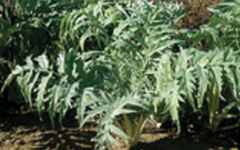CARDOON
HOW TO ORDER
CARDOON
syn. Artichoke Thistle Cynara
caredunculus For growing instructions See Cultivation below.
(Plant heights are given at maturity)
 Cardoon (110
days) Cynara caredunculus - Mediterranean native prized
for the leaf stalks, whose hearts are boiled, sauteed
or cooked and served chilled with oil and
vinegar. Interesting change from the average salad.
Full sun.
Cardoon (110
days) Cynara caredunculus - Mediterranean native prized
for the leaf stalks, whose hearts are boiled, sauteed
or cooked and served chilled with oil and
vinegar. Interesting change from the average salad.
Full sun.
ORDER EARLY!
See TERMS
CULTIVATION
Cardoon is an herbaceous perennial native to southern Europe and
northern Africa belonging to the Daisy family, Compositae and in
the same genus as artichokes.. The plant has large deeply
cut grey-green slightly hairy leaves with white undersides. Blooms
are purple. A good choice for warm climates with damp
summers. Hot conditions cause the leaves to become
bitter. Plants do best on deep fertile soils. The
plant reaches a height of 4-5 feet.
Cardoon has a long history of cultivation - it was described in
ancient Greek texts. Popular in the middle ages and the
Renaissance, it came to America with the colonists, but fell out
of favor in the late 1800s. Leaves, roots and flowers
are eaten. Blooms are used as a rennet substitute in making
vegetarians cheeses or in the same manner as artichokes.
Leaves are best used before the flowers open and are boiled or
cooked, incorporated into soups or as a side dish vegetable.
Oil pressed from the seeds is used in cooking.
Medicinally, cardoon contains cynarin, a bitter compound that is
used to treat liver, gall bladder, and pancreatic complaints .
Cardoon is propagated from seed which can be sown directly into
the garden or started as transplants or as cuttings or
divisions. To grow transplants, sow seed thinly in trays or
pots allowing 2 inches between seeds or, if using plug trays,
plant 2-3 seeds in each section (thin seedlings when they emerge
to 1 plant per section). Keep moist at 70-75F until
germination. Transplant to larger containers when seedlings
reach 3-4 inches in height. Transplant outdoors when
temperatures remain above 50F.
To sow seed directly into the garden, prepare soil . Dig trenches
8-9 inches deep 3 feet apart. Cover to a depth of 1 inch.
Sow 4-5 seeds in hills in the trench every 2 feet. When
seedlings reach about 3 inches in height, thin seedlings to one
plant per hill. Cultivate to keep weeks down and water
during dry spells.
For cuttings, take stem pieces and place them in moist sand.
They will root readily. Divisions can be taken from adult
plants in spring.
Blanching. Cardoon is blanched rather like
celery. In early fall or 6-8 weeks prior to harvesting,
gather the leaves together in an upright position. Surround
the leaf bundle with hay or straw, then heap soils up around the
straw to forn a mound with the cardoon in the center. Plants
should be properly blanched within 6-8 weeks. When this is
accomplished, leaves can be harvested.
Harvest: Cut leaves right before flowers open
removing the tips of the leaves. Hold at 32F at 95% humidity
to prevent wilting or drying.
SEED SPECS:
Seed Count: Average 700 seeds per ounce, 4-5lb
seeds per acre
Back to VARIETY INDEX
Terms HOME
 If you have
arrived in someone else's frame, or can not see all of the other
information available on richfarmgarden.com Click on logo to enter
from beginning
If you have
arrived in someone else's frame, or can not see all of the other
information available on richfarmgarden.com Click on logo to enter
from beginning
 Cardoon (110
days) Cynara caredunculus - Mediterranean native prized
for the leaf stalks, whose hearts are boiled, sauteed
or cooked and served chilled with oil and
vinegar. Interesting change from the average salad.
Full sun.
Cardoon (110
days) Cynara caredunculus - Mediterranean native prized
for the leaf stalks, whose hearts are boiled, sauteed
or cooked and served chilled with oil and
vinegar. Interesting change from the average salad.
Full sun.